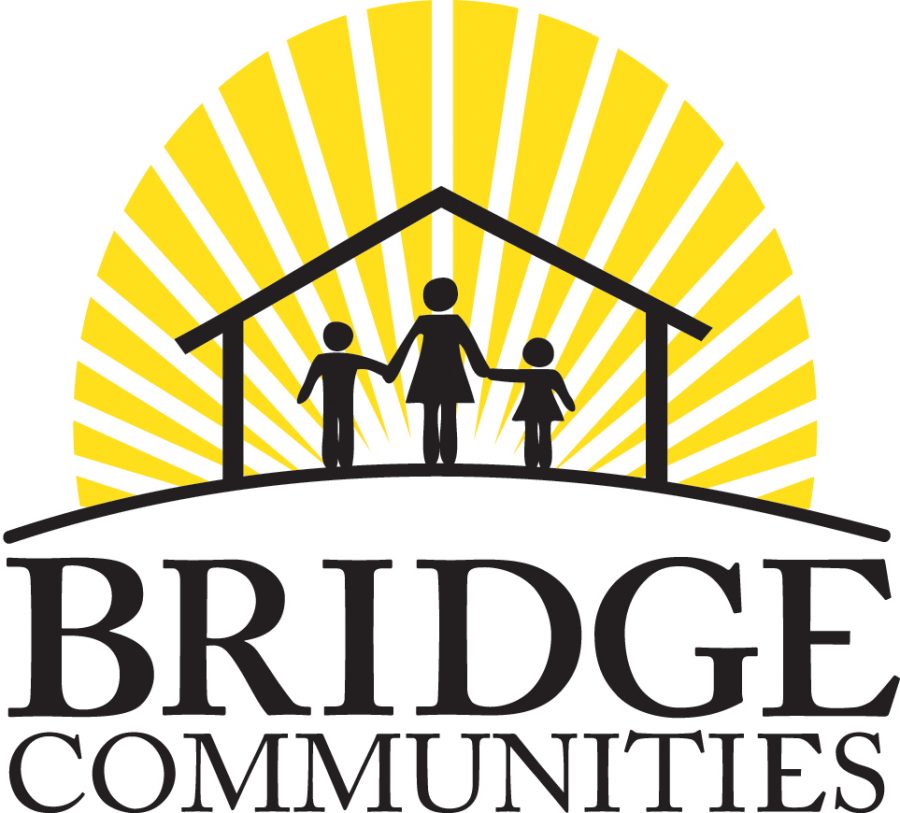Bridge Communities, Humanitarian Service Project help families, individuals get back on their feet
Read about how local and school organizations are giving back to our community.
Bridge Communities used with permission from Lisa Doyle.
Bridge Communities used with permission from Lisa Doyle.
Bridge Communities is a non-profit organization that provides free transitional housing to 131 homeless DuPage County families each year. The program is usually two years long and helps families save money, learn how to budget, and acquire better employment to maintain a self-sufficient life after their graduation from the program.
In order to become part of the program, potential candidates must meet certain requirements: they must work or live in DuPage County, the head of the household must be at least 21 years old, and the family must have a child under age of 18. An intake team interviews candidate families to check for minimum qualifications, and if those are met, the family fills out a lengthy application.
The next step is meeting with a manager for a background check. Once cleared, the family’s case is discussed with an intake team and case management directors to decide whether the family is appropriate for the program.
The families are also interviewed by the volunteers to see if they will work well together. Once accepted, the program offers an employment training component that helps families get better at interviewing and building better resumes. An educational team helps families connect to colleges and offers tutors for kids.
Lisa Doyle, Marketing and Communications Manager of Bridge Communities, states, “[There’s] a high success rate, generally a year after graduating from the program about 95% of our families are still in safe, permanent housing, they’re still working, they’re still doing great.”
A family graduates from the program when they are able to support themselves with their own shelter and food.
After families graduate from the program, Bridge Communities follow up with their clients by calling, emailing, or surveying. “Because [the families] work so closely with us they form such close relationships with us, there’s a lot of trust, between us and families,” says Lisa Doyle.
Bridge Communities has a staff of 22-23 people but volunteers are the “heart and soul of Bridge,” claims Lisa Doyle.
Similar to Bridge Communities, Humanitarian Service Project, located on 465 Randy Rd, in Carol Stream, also helps seniors, children, and families in poverty to alleviate their suffering and stress. Humanitarian Service Project offers three programs: Christmas Offering, Senior Citizen Project, and Children’s Project.
Christmas Offering is for Christmastime; through donations, gifts are sent to the kids as a part of the program. For the Senior Citizen Project, about 100 pounds of groceries are delivered directly to senior citizens’ homes every month. For the Children’s Project, nutritional support is offered to families in need as well as a birthday box and school supplies for the children.
All the projects receive funding through generous donations that are collected through drives that are conducted throughout the year. Anyone can donate food, toys, books, and personal care products, such as shampoo and soap, directlyto the Humanitarian Service Project’s Carol Stream address.
Around Christmastime, you can also buy gifts for kids, wrap them, and drop them off. Donations can be dropped off by mail or in person Monday through Friday from 8:30 a.m. to 4:30 p.m.
There are several ways that you can help according to Kristen Senne, Executive Director of Humanitarian Service Project. Drives can be hosted by anyone and the collected donations can be dropped off at the center. Also, donating books or toys to the toy drive for children is another effective way to help. Plus, anyone can volunteer for Humanitarian Service Project by sending an email to [email protected] about volunteer positions such as food sorting, pantry stocking, or others.
Volunteering is not the only way a person can help. Humanitarian Service Project offers birthday boxes, and one can host fundraising event at parties or even create their own idea to help. There’s also Sponsor a Child for $130 per year which includes food and a birthday box for the child. There are many variations of assistance depending on how much or how little can fit in a donor’s budget.
According to the Federal Poverty Guideline, for a family to qualify for the poverty range, the family must fall under an income of $30,000 pre-tax for a household of four family members. For families that fall under those guidelines, Humanitarian Service Project helps in several ways. A family can be referred to HSP by caseworkers from the county, principals or social workers from school, or building managers of subsidized housing.
Bridge Communities and Humanitarian Service Project are great community organizations focused on helping families in need. Glenbard West also offers students the opportunity to give back to their community.
Mr. Peterselli, English Department Chair and Key Club sponsor, says that through Key Club the “school takes an active role in assisting individuals and groups throughout Chicagoland by offering assistance to community projects and citizens.”
Key Club members perform activities and fundraising projects like car washes, Peanut Day donations, food drives, and other activities to collect for donations.
Another opportunity at West is with Interact. Mr. Kelly, science teacher, sponsors Interact, which is a part of Rotary International. This club is a service group designed for high school students and supported by Glen Ellyn Rotary International. One of the group’s goals is to demonstrate helpfulness and respect for others, which is done by encouraging members to put service above self and work to benefit local and national communities.
Many West students find their own opportunities to give back. Emma Blackwell, senior, went to Cincinnati for three days with her church as a sophomore to help at a homeless shelter.
“We tour as a musical handbell choir, but beyond just playing music, we also provide services to the public whether it be through volunteer work or bringing donations to places,” she states. “The homeless shelter was a great way for me to see how volunteering can make an impact on peoples lives and how important and gratifying the opportunity can be.”
Molly Molly, another senior, volunteered for DuPage PADS; on one Sunday of each month she would help set up sleeping arrangements. Throughout the night, volunteers bring dinner to those who stay the night and need shelter. Molly started volunteering for service hours but ended up continuing to volunteer since it allowed her to see different perspectives.
You can take the first step to help others, too. Look into Bridge Communities, Humanitarian Service Project, Key Club, Interact, DuPage PADS, or an opportunity through your church.





